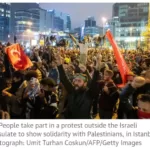Gaza City:With Israeli airstrikes persisting and a total blockade on essential supplies such as food, electricity, medicine, and fuel, Gaza’s 2.3 million residents are facing a dire water crisis that threatens their lives.
The UN agency for Palestinian refugees, UNRWA, sounded the alarm on Tuesday as Gaza’s last seawater desalination plant ceased operations. This closure amplifies the risk of waterborne diseases like cholera and dysentery. Six water wells, three water pumping stations, and a water reservoir, serving over 1.1 million people, are also out of commission.
Israel had previously severed its sole water pipeline to Gaza, along with cutting off the fuel and electricity powering water and sewage facilities. These actions followed Hamas attacks that resulted in a substantial loss of life. UN experts have condemned these Israeli measures as “collective punishment,” a recognized war crime.
Ongoing Humanitarian Crisis
For the past 16 years, Gaza has been subjected to a joint Israeli-Egyptian blockade imposed when Hamas took control of the territory in 2007. Clean water was already a critical concern due to the lack of potable water, inadequate sewage treatment, and restrictions on imports and electricity. Unprocessed sewage has been flowing into the Mediterranean for over a decade.
Desperate residents now find themselves consuming contaminated tap water or digging new, often unsafe wells too close to the sea. With the absence of proper sanitation and limited electricity for water pumps, daily water use for tasks like washing and dishwashing has been cut off. Water distribution occurs sporadically, leaving most people in Gaza surviving on as little as three liters of water a day, well below the World Health Organization’s recommended minimum of 50 liters per person.
Dehydration can quickly lead to a range of health issues, including fatigue, dizziness, confusion, and, in severe cases, coma and death. Timely treatment is essential for recovery, as severe dehydration can cause permanent damage to vital organs.
International Efforts and Challenges
On Tuesday, US Secretary of State Antony Blinken announced a plan to facilitate humanitarian aid to Gaza. However, as night fell, there was no apparent progress in opening the Rafah crossing for civilians to leave or aid to enter.
The ongoing bombardment has been devastating, with more than 3,000 Palestinians killed and the already fragile medical infrastructure left unable to function due to shortages of fuel and medical supplies.
Urgent Need for Clean Water
Access to clean water is paramount for sanitation and healthcare. The WHO has emphasized the role of water in maintaining sanitary conditions in healthcare settings and preventing hospital-associated infections.
While a limited opening of an Israeli water pipeline provided some relief, issues with fuel and damaged pipelines have hindered its effectiveness. UNRWA reported that 400,000 displaced individuals were crowded into UN-run facilities in southern Gaza, receiving only one liter of water a day.
Residents are growing increasingly desperate, with some resorting to drinking saltwater. As the water crisis deepens, the situation in Gaza becomes even more critical.







